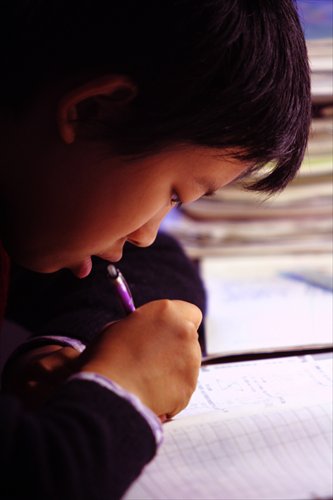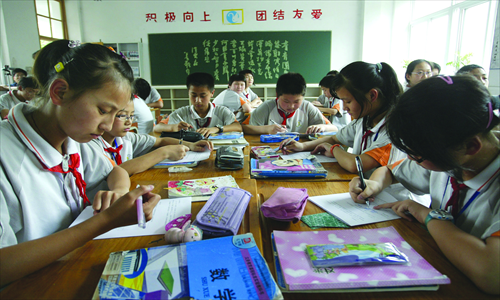HOME >> METRO BEIJING
The cost of cramming
By Zhang Yiwei Source:Global Times Published: 2013-12-15 17:48:02

News of Shanghai teens' success in the 2012 PISA test this month was soured by criticism of China's education system and the pressure it puts on students. Photo: IC
Shanghai retained top spot in an international ranking of 15-year-old students after results of the latest Program for International Student Assessment (PISA) tests were published on December 3. The findings confirmed Shanghai students' place at the top of the world in mathematics, reading and science, but they also reignited debate about whether the country's education system places too much emphasis on rote learning and not enough on fostering creativity .Wang Ye (pseudonym), a student at the Shanghai Economic Management School, was one of 6,374 students from 155 middle schools in the city to take the test in April 2012. The exam is a leading survey of education systems conducted every three years by the Paris-based Organization for Economic Cooperation and Development (OECD).
Unlike other exams which were arranged by her technical secondary school, Wang was surprised that her teachers didn't offer any sample test questions or even encourage her to study hard ahead of it.
"It was fun. Questions were closely related to our daily life and not boring at all," Wang, now 16, said of the nearly three-hour exam.
Differences with Chinese exams
Shanghai's recent triumph marked the second time from as many attempts that students from the city had topped the PISA rankings since China first participated in it in 2009.
In math, Shanghai had the highest average score of 613 points, outperforming second-place Singapore by 40 points; in reading, Shanghai scored 570 on average, ahead of second-place Hong Kong, whose students attained a mean score of 545; and in science, Shanghai scored 580 on average, again edging out Hong Kong for first place.
"To solve some questions, you need to take a reasonable guess instead of relying on precise calculation. In some sense, questions test one's ability to guess correctly," Wang said.
Students from other parts of China, including Fangshan district in Beijing, were chosen to take the test organized by the National Education Examination Authority under the Ministry of Education.
"The questions were not difficult, and mainly required practical solutions. Students should have had no problem handling the test based on the knowledge they gained from their studies," a teacher, surnamed Yang and from Fangshan Middle School, told Metropolitan.
A month before the test, Yang said, teachers prepared students for it by including relevant content in their classes.
A Shanghai PISA project team member told Metropolitan that test results for Chinese cities other than Shanghai would not be released by the OECD because their samples excluded students from technical secondary schools and therefore weren't representative.
However, education authorities in Zhejiang Province broke ranks by disclosing their students' average test scores on December 7 to support authorities' claim that they placed second on a domestic scale to Shanghai in all three disciplines included in the PISA exam.

Education reformists argue the current teaching model is stifling creativity and innovative thinking among students. Photo: CFP
Public cynicism at resultsWhen Shanghai students topped the world in the 2009 PISA exams, their achievement was met largely by public praise, at home and abroad, of the Chinese education system. But when news of their latest success broke earlier this month, it was met with cynicism from some pundits who accused the education system of producing students with "high scores and low abilities."
Long criticized for being exam-oriented and stifling students' creative development, China's education system still routinely comes under fire for being based on memorization rather than innovation.
"The content of basic [primary to middle school] education in our country is difficult and the curriculum quantity is large. There is no need to be proud of Chinese students' good performance," Wang Hongcai, director of the Institute of Education at Xiamen University, told Metropolitan.
Wang acknowledged the importance of students having a solid grasp of reading, science and math, but said high test scores presented a misleading picture of middle school pupils.
"Students are used to cramming from an early age. When they enter high school, they must deal with huge pressure attached to being accepted by a good university. This results in a drain of innovative talent," Wang said.
Zhang Minxuan, head of the Shanghai PISA Center, was also sober in his assessment of the city's success, admitting students' impressive performance masked "weaknesses in our basic education."
"If every student studies math so well, does it mean that the opportunities for students to develop their interests are sacrificed? If they spend more time learning other subjects, they may make greater contributions in other fields in society," Zhang was quoted by the China Youth Daily as saying in a December 4 report.
Sacrificing fun to study
In addition to ranking highest in test scores, Shanghai students also topped the list for most time spent doing homework at 13.8 hours per week, nearly twice the average time spent by students in other countries and regions.
A survey by Internet giant Tencent, which polled nearly 1,000 respondents on their thoughts of Shanghai topping the PISA test and homework hours, found 30 percent believed that the students' performance didn't represent their true proficiency in reading, science or math as much as it reflected their excessive time spent studying.
Another 30 percent of respondents called for students to have lighter study loads, while nearly 20 percent said reactions to Shanghai students' results were "blindly optimistic."
"My son spends nearly two hours doing his homework every day after school," said Fan Tong, whose 13-year-old son is in his second year at a Haidian district middle school.
"He usually goes to bed at about 11 pm, squeezing in some extra study before sleep."
Fan said her son spends most of his weekends studying either at home or at school. Despite wanting her son to enjoy his adolescence, Fan feels torn between fostering his educational and personal development.
"Even though schools are providing more opportunities for students to participate in extra-curricular activities to promote a more well-rounded education model, the activities become time-consuming and contribute to the pressure of preparing for exams," said Fan.
"On one hand, I don't want my son to be immersed too much in studying because it may cause problems when he grows up. But on the other hand, I have to urge him to study diligently because his academic performance will ultimately influence his future."
Xiong Bingqi, an education expert and vice president of the 21st Century Education Research Institute, told Metropolitan that Chinese students spend almost all their energy studying, even if it means sacrificing their sleep and health.
"By comparison, foreign students spend just 25 to 40 percent of their time on study, giving them more freedom to participate in activities they are interested in," Xiong said.
"The problem with our country's education system is that aside from curriculum-based education, all other areas are incomplete or even blank. We have a long way to go to make up for all these shortcomings."
Posted in: Metro Beijing